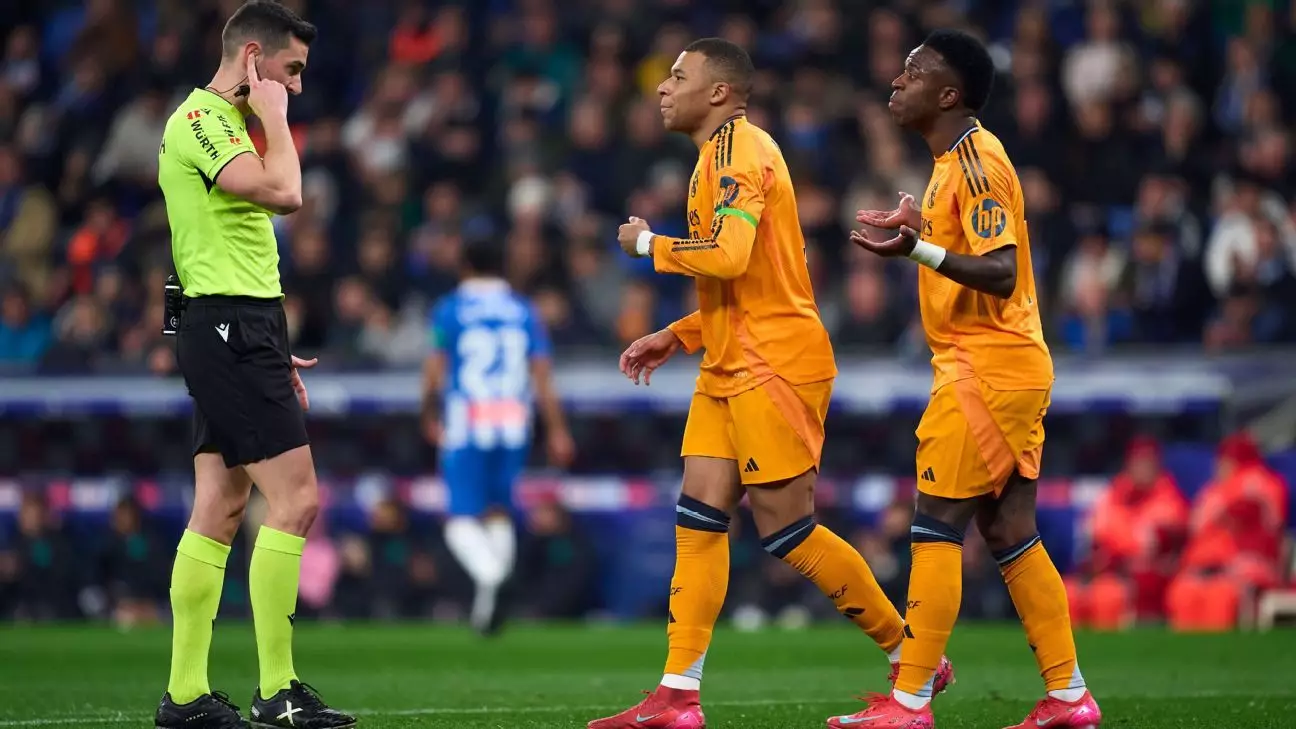Real Madrid, one of the most prestigious football clubs in the world, recently stirred the pot in LaLiga by lodging a formal complaint regarding refereeing decisions that they deemed detrimental to their performance. This incident stemmed from their narrow 1-0 defeat against Espanyol, which occurred earlier this month. The club’s dissatisfaction focused on referee Alejandro Muñiz Ruiz’s choice not to dismiss Espanyol defender Carlos Romero after a contentious challenge on Real Madrid’s star player, Kylian Mbappé. Romero’s subsequent scoring of the match’s only goal only intensified Madrid’s frustration. This article examines the implications of Madrid’s complaint, their engagement with the Spanish refereeing body, and the overarching issues of refereeing standards in Spanish football.
The crux of Real Madrid’s complaint lies in the challenge made by Romero against Mbappé, which they argued warranted a red card. Their formal grievance accused the refereeing officials of “manipulation and adulteration” of the competitive integrity of LaLiga. Madrid’s claim that Spain’s refereeing system is “completely discredited” raises serious questions about the standards employed by officials in the league. Such accusations are particularly heavy for a club that has historically enjoyed significant success and is expected to uphold the integrity of the sport.
In a bid to seek clarification and transparency, Madrid took the unusual step of reaching out to leaders at the Spanish football federation (RFEF). After making a public request for access to audio recordings of the VAR discussions surrounding the game, Real Madrid officials met with Luis Medina Cantalejo, the head of the Technical Committee of Referees. This meeting, held at RFEF headquarters, symbolizes a pivotal moment in Real Madrid’s dealings with refereeing standards and suggests that the club is willing to take a stand against perceived wrongdoing.
During the discussions, Medina Cantalejo communicated that inquiries concerning officiating decisions are not uncommon. The dialogue was framed as positive, occurring in an atmosphere of mutual respect. However, it is crucial to question whether such discussions will lead to any substantive changes in officiating practices. The atmosphere described may be cordial, but the realities of Real Madrid’s complaints reveal an undercurrent of deep dissatisfaction and frustration that could pose serious implications for Spanish football moving forward.
Despite this meeting, insiders reportedly indicated that Madrid remained baffled by the failure to issue a red card to Romero. Compounding their grievance was the club’s growing concern that by bringing attention to the officiating controversy, they put themselves in a vulnerable position, especially given subsequent games where refereeing decisions have also come under scrutiny. This ongoing distress concerning officiating decisions raises a broader issue that is symptomatic of deep-rooted problems within the refereeing framework in Spanish football leagues.
It is evident that the issues surrounding officiating are not limited to just one match or club. Real Madrid’s complaints echo sentiments felt throughout various levels of the league, highlighting a potential systemic issue with how games are officiated. Manager Carlo Ancelotti expressed concerns about decisions made in their last three games, affirming that “something has happened that shouldn’t have happened.” Such sentiment is shared across the league as clubs grapple with their own grievances concerning referee decisions, which often leave them feeling aggrieved and seeking accountability.
This fractious atmosphere undermines the integrity of the league and calls into question how refereeing decisions impact competitive fairness in LaLiga. Every missed call or contested decision reverberates beyond just one match; it influences fan perceptions, club reputations, and ultimately the legitimacy of the league itself. Madrid’s bold approach may compel the RFEF to take a more critical look at their officiating standards, but skepticism remains as to whether real changes will occur.
Real Madrid’s engagement with the RFEF following their controversial match against Espanyol is significant for more than just the club’s interests; it may represent a crucial inflection point for refereeing standards in Spanish football. As public discourse around officiating escalates, only time will tell if such actions yield positive changes or if they merely highlight the ongoing struggles within the system. Madrid’s fight for clarity, accountability, and fairness encapsulates a critical chapter in the development of football officiating that will likely reverberate throughout the league for years to come.
